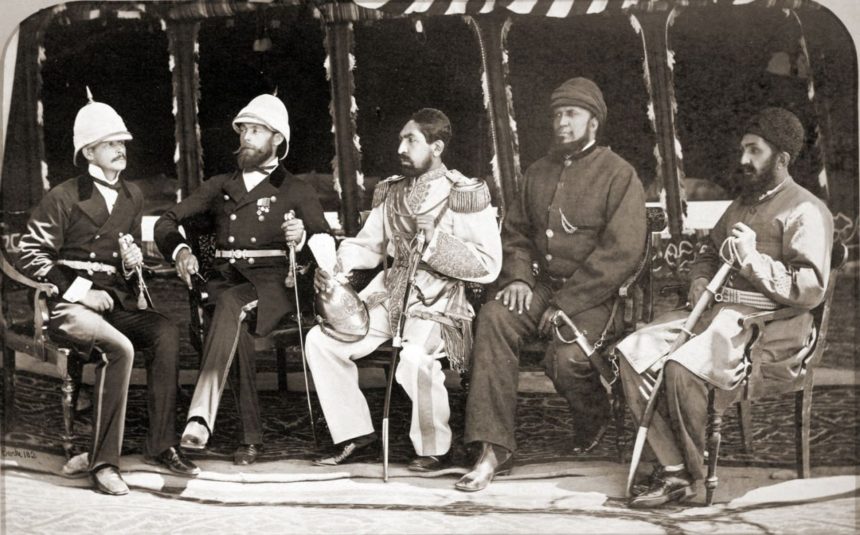The ignominious Gandomak treaty stands as a sequel to the power-hungry aspirations and unceasing dominance of the Barakzai rulers. It was signed in 1873 by Amir Mohammad Yaqoub Khan with the British or the East India Company of that era. In an endeavor to fortify his political authority and familial control, Amir Mohammad Yaqoub Khan acquiesced to the demands of contemporary Britain by signing this treaty, thereby relinquishing a portion of the country’s land to the East India Company.
In the historical narrative, as the Abdali family assumed power in the country, two major colonial powers of the time—Russia (Tzarist) and the East India Company (or the British)—vied for political influence over the soil of Khorasan with the Kings of this family. On each occasion of their engagement with these colonizers, various treaties were signed between them and the inept rulers of these two families, resulting in the separation of a part of the country’s land from the core geography of Khorasan. One of the ignominious historical treaties of the country, signed by Amir Mohammad Yaqoub Khan with the British in ten articles, ceded a portion of Khorasan’s land to the British and the East India Company. Known as the Gandomak Treaty, it was signed in May- 27- 1879 between Amir Mohammad Yaqoub Khan, the ruling leader at that time, and “Kyunari,” the representative of the British.
According to historical accounts, by signing this treaty, Amir Mohammad Yaqoub Khan handed over regions from Kurm to the beginning of Jaji, the Khaybar Valley to the eastern side of Haft Chah, Lundi Kotal to Sibi, and pushin to Koh Kozhak—essentially the heartland of Greater Khorasan—to British sovereignty and the Indian dominion. This historical treaty, considered a significant achievement for the British to gain control over vital regions of Khorasan (Bolan, Piwar, and Khaybar), was celebrated with pomp in London. Amir Mohammad Yaqub Khan, officially proclaimed as the king under British patronage by signing this treaty, concurred in its third article that, “In relations with foreign governments, advisory consultation would be tied with the British government, and in case of foreign aggression, military assistance, weapons, and English currency would be utilized as deemed appropriate by England for defense.”
In the ninth article of this ignominious treaty, Shah Barakzai accepted that, “The British government would take responsibility for Khyber, located between Peshawar and Jalalabad, and also the affairs of the tribal movements in this region.” As per the generous terms of this political agreement (deal over the Afghanistan soil), the British government committed to paying an annual reward alongside recognizing his emirate. In accordance with the tenth article, this annual payment amounted to 600,000 rupees.
In the account of “Afghanistan in the Last Five Centuries,” Mohammad Yaqoub Khan, immediately after hearing the news of his father’s death, assumed the throne of the emirate. This was despite the country being surrounded by the British on three sides. Without defending the country and through a letter to the British about his father’s demise and his own ascent to the throne, he proposed negotiations and friendship. The British, intrigued by his proposal and the Gandomak scheme, accepted it. Alongside establishing their embassy in Kabul and gaining control over Afghanistan’s foreign policy, they requested regions considered defensive barriers for themselves.
According to contemporary Afghanistan history: “There is no doubt that at that time, the Afghanistani army faced defeat against the invaders, and British forces entered Afghanistan. However, the national force of the Afghanistani people, whose strength had been proven in the first Anglo-Afghanistanis war, remained present and awaited a leader to guide them in the war against the enemy.” Nevertheless, Yaqoub Khan, oblivious to the free will of the Afghanistani people to confront the British, engaged in a disgraceful deal to sustain and preserve his power, thrusting Afghanistan once again into the depths of British colonialism. Afghanistani historians, considering the patriotic sentiments of the country’s people against the contemporary invaders, have written that if Amir Mohammad Yaqoub Khan had resisted the British attacks with reliance on the national-popular force and failed to defeat them, at least the conditions of the Durnad treaty that he signed would not have been as one-sided and detrimental to the country.
The fact that Amir Barakzai was a power-thirsty ruler, eager to preserve it, was evident as he lost his psychological balance during successive years in prison, where he was once powerful. History narrates that, after signing the Gandomak treaty, Kyunari was appointed as the British ambassador to the country. With a team of 750 English guards, he entered Kabul and took residence in the fortress of Amir Mohammad Azam Khan, leading to direct interference in the country’s internal affairs, not covered by the Durnad treaty. These intrusive actions soon led to the arousal of national and patriotic sentiments among the people.
Contemporary Afghanistan history still notes that the same national force and patriotic sentiments, neglected in the signing of the ignominious Gandomak treaties by Amir Barakzai, were revitalized after the overt interventions by the British ambassador and his associates, with the partial support of the disbanded army. Alongside burning the embassy, the ambassador and his colleagues were killed. However, the signing of the shameful Durnad treaty, coupled with the permanent loss of parts of Greater Khorasan’s land, left a lasting shameful scar on the forehead of the tribal rulers.






